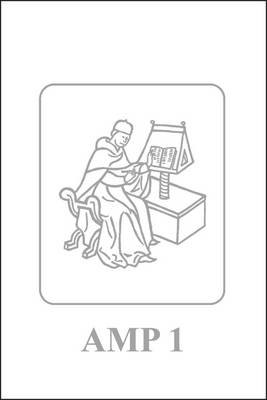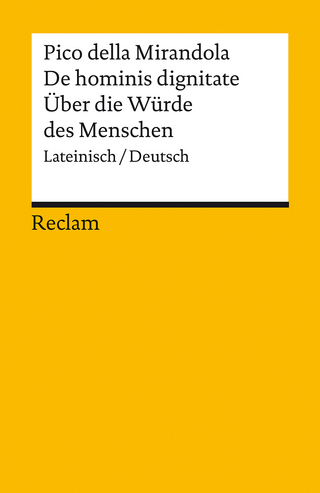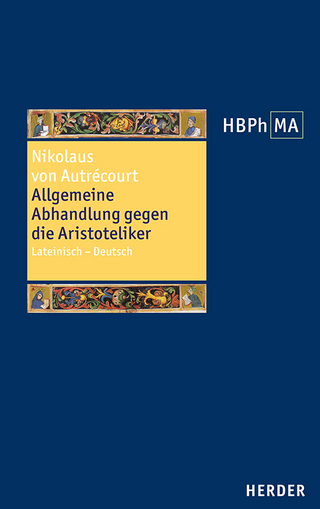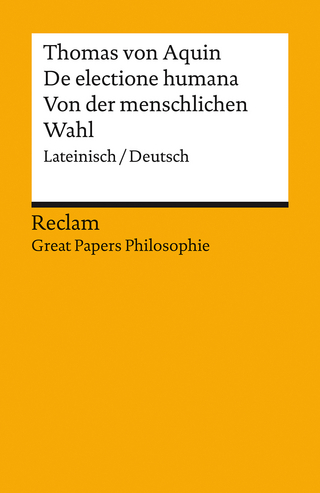
John Pagus on Aristotle's "Categories"
Leuven University Press (Verlag)
978-90-5867-913-0 (ISBN)
- Lieferbar (Termin unbekannt)
- Versandkostenfrei innerhalb Deutschlands
- Auch auf Rechnung
- Verfügbarkeit in der Filiale vor Ort prüfen
- Artikel merken
Extensive study of one of the first extant thirteenth-century commentaries on aristotle's categories.
The Rationes super Praedicamenta Aristotelis of John Pagus is one of the earliest known literary products of the Arts Faculty of the University of Paris. Written in the 1230s, it is among the first extant commentaries on Aristotle's Categories and reflects a period in which philosophers had already absorbed the full range of Aristotle's logical writings and were becoming increasingly familiar with his physical and metaphysical works. The present volume contains the first full critical edition of the text, preceded by an extensive introductory study consisting of two parts. The first part describes the life and work of John Pagus, the manuscript sources, formal features, authoritative sources, and date of his commentary, as well as its relationship to other known commentaries from the period. The second part is devoted to an analysis of some of the key features of Pagus' interpretation of the categories. The author takes account of Pagus' systematic construal of Aristotle's text, focusing particular attention on his position on perennial issues such as what categories are, which categories there are, what sort of items they collect, whether or not they can overlap, and the relationship between logical and metaphysical categories. To more appreciate and understand Pagus' approach, the volume also pays considerable attention to the views of his near-contemporaries Nicholas of Paris and Robert Kilwardby.
This publication is GPRC-labeled (Guaranteed Peer-Reviewed Content).
Heine Hansen has studied classics at the University of Copenhagen and holds a PhD in Philosophy from the University of Sydney (2010). He is currently a postdoctoral fellow at the University of Copenhagen.
Preface
PART ONE INT RODUCTORY ST UDY
Chapter One The Author and his Work
Introduction: Logic in the Thirteenth Century
1 John Pagus: Life and Works
1.1 Life
1.2 Works
2 The Commentary on the Categories
2.1 Manuscript Sources
2.2 Formal Features
2.3 Authoritative Sources
2.4 Contemporary Commentaries
2.5 Date of Composition
Chapter Two Pagus' Interpretation of the Categories
Introduction: Aristotle's Categories
1 The Categories and Logic
2 The Subject Matter of the Categories
3 The Notion of a Category
4 Equivocals, Univocals, Denominatives
5 The Ontological Square
6 The Antepredicamental Rules
7 The Content of the Category System
8 Substance
9 Accidents
Appendix Stylistic Comparison of the Commentaries in MS Padua, Biblioteca Universitaria 1589
PART TWO EDITION
Chapter Three Editor's Preface
1 Ratio edendi
2 Sigla et Compendia
Chapter Four John Pagus: Rationes super Praedicamenta Aristotelis
1 Aequivoca dicuntur etc. (1.1a1)
2 Univoca dicuntur etc. (1.1a7)
3 Denominativa dicuntur etc. (1.1a13)
4 Eorum quae sunt alia sunt in subiecto etc. (2.1a20)
5 Quando autem alterum de altero etc. (3.1b10)
6 Eorum quae secundum nullam complexionem dicuntur etc. (4.1b25)
7 Substantia est quae proprie etc. (5.2a12)
8 Manifestum est autem etc. (5.2a19)
9 Secundarum vero substantiarum etc. (5.2b7)
10 Merito autem post principales etc. (5.2b30)
11 Commune est autem etc. (5.3a7)
12 Inest autem substantiis etc. (5.3a33)
13 Inest autem substantiis etc. (5.3b25)
14 Maxime vero etc. (5.4a10)
15 Sed et si quis hoc suscipiat (5.4a27)
16 Quantitatis autem etc. (6.4b20)
17 Partium etenim numeri (6.4b26)
18 Linea vero continua est (6.5a1)
19 Amplius quidem (6.5a15)
20 Proprie autem quantitates (6.5a39)
21 Amplius quantitati nihil est contrarium (6.5b12)
22 Amplius si magnum et parvum (6.5b33)
23 Sed non videtur quantitas suscipere (6.6a20)
24 Ad aliquid vero talia dicuntur (7.6a36)
25 Inest autem contrarietas (7.6b15)
26 Omnia autem relativa ad convertentiam dicuntur (7.6b27)
27 Omnia ergo quae ad aliquid dicuntur (7.7a22)
28 Videtur autem ad aliquid simul esse natura (7.7b15)
29 Habet autem quaestionem utrum nulla substantia (7.8a14)
30 Ex his ergo manifestum est (7.8a35)
31 Qualitatem autem dico etc. (8.8b25)
32 Aliud vero genus qualitatis (8.9a14)
33 Tertia vero species qualitatis etc. (8.9a28)
34 Quoniam ergo fiunt per aliquam etc. (8.9b12)
35 Quartum vero genus (8.10a11)
36 Inest autem contrarietas secundum quod quale etc. (8.10b12)
37 Triangulus vero etc. (8.11a5)
38 Suscipit autem facere et pati etc. (9.11b1)
39 Quotiens autem solet opponi etc. (10.11b17)
40 Quorum vero non est necessarium etc. (10.12a9)
41 Non est autem neque quod sub affirmatione etc. (10.12b5)
42 In privatione vero et habitu etc. (10.13a3)
43 Quaecumque vero ut affirmatio et negatio (10.13a37)
44 Contrarium autem etc. (11.13b36)
45 Prius autem quadrupliciter dicitur etc. (12.14a26)
Appendix Anonymus Patavinus: Commentarii in Praedicamenta Aristotelis fragmentum
Bibliography
Index Locorum
Index Quaestionum
| Reihe/Serie | Ancient and Medieval Philosophy–Series 1 |
|---|---|
| Verlagsort | Leuven |
| Sprache | englisch |
| Maße | 160 x 239 mm |
| Gewicht | 57 g |
| Themenwelt | Geisteswissenschaften ► Philosophie ► Philosophie des Mittelalters |
| ISBN-10 | 90-5867-913-6 / 9058679136 |
| ISBN-13 | 978-90-5867-913-0 / 9789058679130 |
| Zustand | Neuware |
| Haben Sie eine Frage zum Produkt? |
aus dem Bereich


